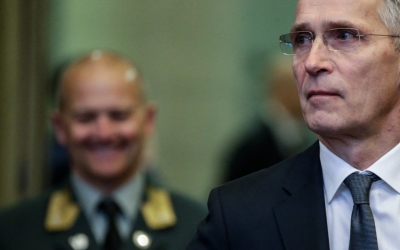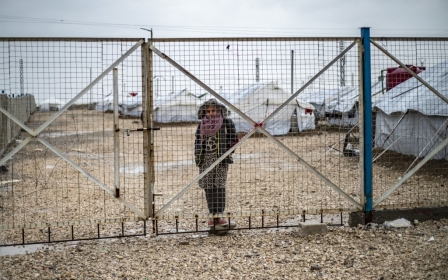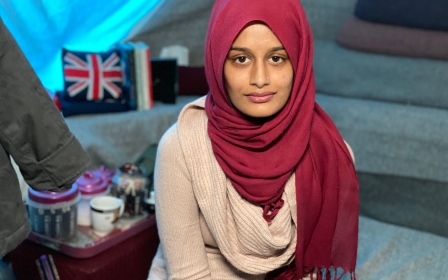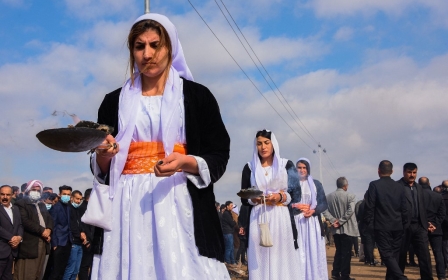Rights group renews call for foreigners to be repatriated from Syrian camps
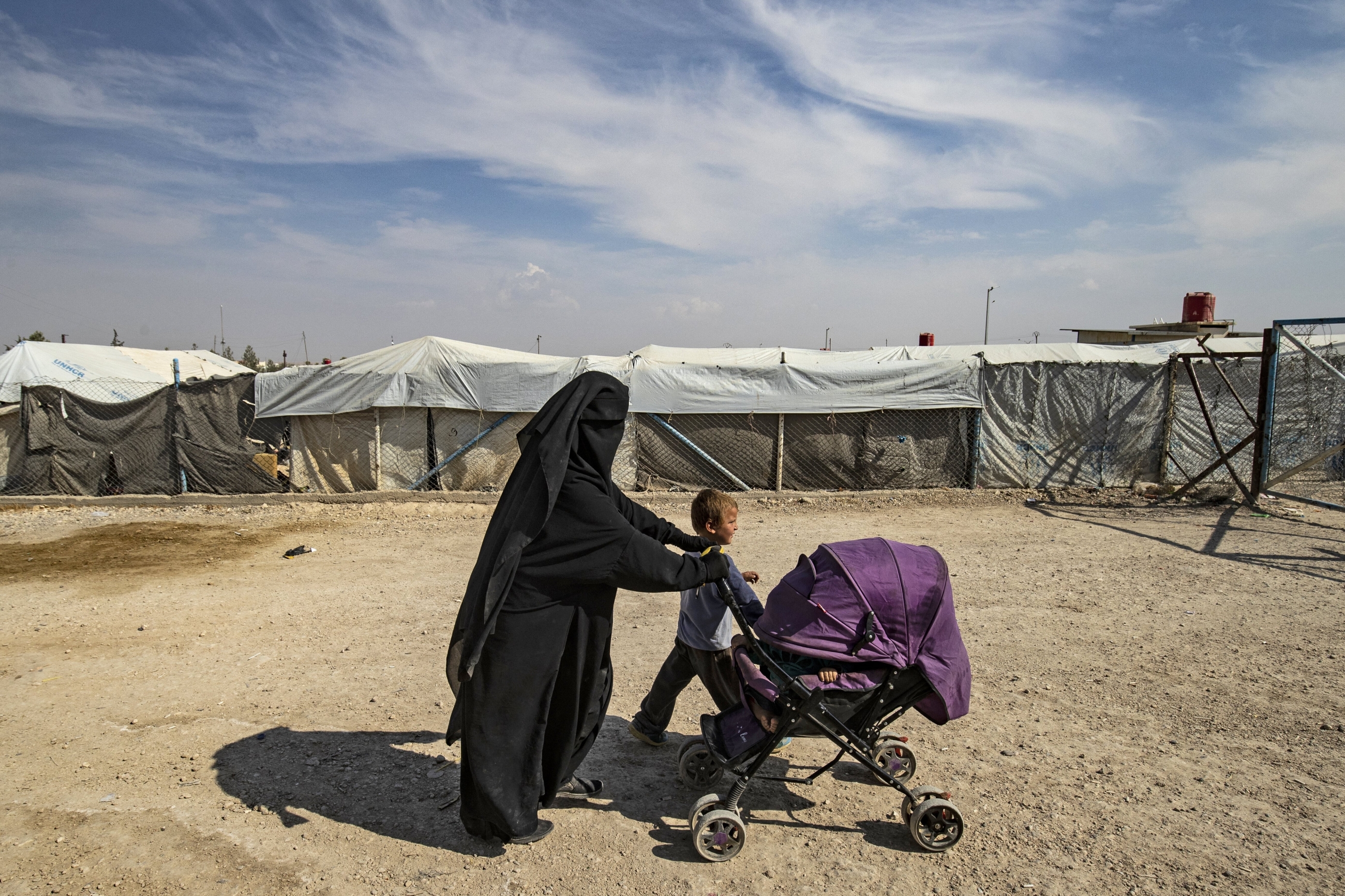
Nearly 43,000 foreigners linked to the Islamic State (IS) group remain detained in "inhuman or degrading conditions" in northeast Syria, Human Rights Watch (HRW) has said, as it called for countries across the world to repatriate their citizens.
Most of the detainees - including women, men and children - were rounded up two years ago during the fall of IS and are being held "with the explicit or implicit consent of their countries of nationality", HRW said in a report released on Tuesday.
'Governments should be helping to fairly prosecute... not helping to create another Guantanamo'
- Letta Tayler, HRW
"The foreign detainees have never been brought before a court, making their detention arbitrary as well as indefinite," the group noted.
Countries across Europe, as well as the United States, have for years been hesitant to repatriate those accused of IS membership or their family members, pushing the burden of continued detention off onto the regional authority in northeast Syria.
Alongside the foreigners being held are roughly 20,000 Syrians HRW noted. Another 31,000 are from neighbouring Iraq, while nearly 12,000 others - mostly children - are from almost 60 other countries.
New MEE newsletter: Jerusalem Dispatch
Sign up to get the latest insights and analysis on Israel-Palestine, alongside Turkey Unpacked and other MEE newsletters
Conditions for the non-Iraqi foreigners, who are kept in special annexes, are particularly dire, the group warned.
'Unlawful detention'
Letta Tayler, associate crisis and conflict director at HRW, highlighted the importance of repatriation, given the lack of jurisprudence in northeast Syria as well as deteriorating living conditions.
"Men, women, and children from around the world are entering a third year of unlawful detention in life-threatening conditions in northeast Syria while their governments look the other way," Tayler said in Tuesday's report.
"Governments should be helping to fairly prosecute detainees suspected of serious crimes and free everyone else, not helping to create another Guantanamo," Tayler continued.
Among the foreign detainees, 27,500 - more than half - are children who have been locked in refugee-like camps. Only 300 foreign detainees are men being held in prisons, described by HRW as "squalid". Scores of others are being held in locked rehabilitation centres, the group said.
The women being held in the camps are largely accused of being relatives of IS fighters.
HRW said that world governments are actively contributing to abusive confinement by refusing repatriation, warning that such countries "may be complicit in the unlawful detention and collective punishment of thousands of people".
Poor living conditions
According to humanitarian groups and the UN Office of Counterterrorism, more than 700 detainees in the camps of al-Hol and Roj – at least half of them children – have died in the past two years.
Detainees across the board are suffering from rising levels of violence and falling levels of vital aid including medical care, the group said.
The UN and donors, including many home countries of the foreign detainees, are providing humanitarian aid to the detainees and others in northeast Syria. But according to UN experts, dire shortages of clean water, food, medicine, as well as adequate shelter and security, continue.
'Indefinite detention without judicial review is unlawful'
- Letta Tayler, HRW
The US-led international coalition against IS reportedly plans to fund the construction of additional detention centres for women suspects, as well as a 500-bed "rehabilitation center" for older boys. But HRW warned that improving conditions of detention is not a suitable solution.
"Improving horrific prison conditions does not change the fact that indefinite detention without judicial review is unlawful,” Tayler said in Tuesday's report.
"Expanding prisons and locked rehabilitation centers to warehouse hundreds of children who never even chose to live under ISIS is unconscionable," she continued.
HRW representatives recently spoke with several women being held in such camps who complained of brutal treatment by camp guards.
"Women caught with cell phones or suspected of withholding information about crimes in the camp were sometimes beaten and jailed for days or even weeks," the report said, adding that women who tried to flee the camps had also been jailed for several days after being caught.
The regional authority, called the Autonomous Administration of North and East Syria, denied any abuse by guards and told HRW that some women had attacked guards with stones and sharp objects.
'A huge burden'
Badran Chia Kurd, the Autonomous Administration’s deputy co-chair, told HRW that holding the foreigners "is a huge burden" for the cash-strapped Autonomous Administration.
"The international community, in particular the countries who have citizens in the camps and prisons, are not assuming their responsibility. This issue, if not solved, will not only affect us, but the entire world," Chia Kurd told the group.
Neither the United States nor other members of the international community, including countries with nationals detained in northeast Syria, have funded any measures to provide the prisoners with due process, Chia Kurd said.
Meanwhile, the Autonomous Administration's military, known as the Syrian Democratic Forces (SDF), warned on Tuesday of a re-emergence of IS.
In a statement to mark the SDF's two-year anniversary of its victory over IS, the force said they fear Islamic State members could be recruiting fresh fighters, including the tens of thousands of suspected IS relatives detained in the overcrowded camps.
The SDF said the counter-terrorism efforts it focuses on today were "more difficult than face-to-face fighting" and are also considered "more dangerous".
"The fall of the last patch of IS territory in northeast Syria does not mean complete defeat," the group said.
The IS group retains some 10,000 active fighters in both Syria and Iraq, although the majority are reported to be in Iraq, the United Nations said in a recent report.
Middle East Eye delivers independent and unrivalled coverage and analysis of the Middle East, North Africa and beyond. To learn more about republishing this content and the associated fees, please fill out this form. More about MEE can be found here.



